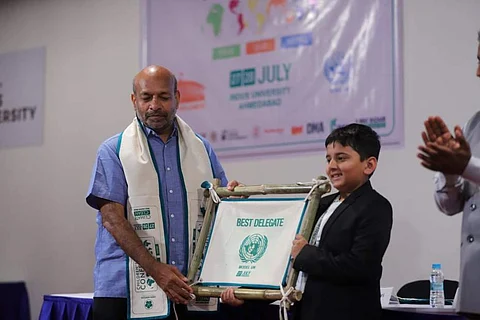

Did you know that pencil shavings can be recycled? As children, we used to create butterfly-like artwork with those or simply play with them, but this eight-year-old from Trio World School, Bengaluru realised that pencil shavings are an untapped recyclable product. It can be used to form the outer covering of the pen and hence reduce the usage of plastic. Sharanavya S Shrish's estimated calculation showed that about 30 Kg of pencil shavings can be collected from a primary school every month and thus be recycled after collection. His environment-friendly project won him the Best Delegate Award and the Best Researcher Award for his presentation and unique recycling idea at the Model United Nations (MUN), Children Climate Conference held at Ahmedabad held on 27 and 28 July, 2019.
The process of recycling the pencil shavings will involve setting up of collection-boxes — known as Green-bins for pencil shavings in each class, its collection, and setting up of small-scale industries for production of pens made from pencil shavings. The eight-year-old also made a prototype using pencil shavings, clay, glue and slime and termed it Claywood. The project will contribute towards betterment of environment by recycling pencil shavings and reducing the use of plastic, says his father, Shantanu Shrish.
So, how did Sharanavya come up with a brilliant idea at such an young age? "Sharanavya’s school is a home to a few ducks and ducklings, they organise environmental rallies, promote rain water harvesting and more. These activities have inculcated in him a sense of caring for the environment. Sharanavya’s classroom mainly was his inspiration. He observed that his classmates use at least half a pencil each day. The sharpened dust is made of wood and goes to one common dustbin kept in each classroom. The urge to utilise this recyclable wastage coupled with the fact that the children will be using pens (made of plastic) in next semester inspired him to create something that will serve the dual purpose of recycling the existing resources and reduction of usage of what he calls as the Plastic Monster," adds his father.
Apart from his recent recycling project, the eight-year-old has developed a sense of empathy towards the plight of small birds, adds his father. "He has learned that the birds’ behaviour is mainly affected by two factors — excessive radiation from cell-phone towers and a lack of space to lay eggs due to increased construction. Due to the prevalent apartment culture and tendency to keep clean houses, people ignore the birds’ requirements and therefore we rarely see these birds near our homes nowadays. Small birds like sparrows are not capable of making nests and look for small nooks and corners in houses for a safe place to lay eggs. Inspired by the renowned environmentalist Jagat Kinkhabwala, Sharanavya yearns to provide these little birds homes where they can peacefully lay eggs. One can recycle and convert cardboard, old shoe boxes etc, into small bird houses which can be installed at various places like our balconies," explains Shantanu. Sharanavya has also convinced his school principal to put such boxes in the school campus, which they have agreed to.
Even when most of us as elders do not understand what effect climate change could really have on the environment, this eight-year-old eco-warrior believes that climate change is mainly due to the irresponsible use of our resources, radiations due to towers, use of plastic and our inability to recycle leading to disastrous consequences. "While concluding his presentation at the Children’s Climate Conference, Sharanavya humbly requested each person to contribute in even smallest way possible to save the environment. He urges each of us to segregate waste into dry, wet, medical, E-waste etc. He recommends single-use plastic boycott," concludes Shantanu.
